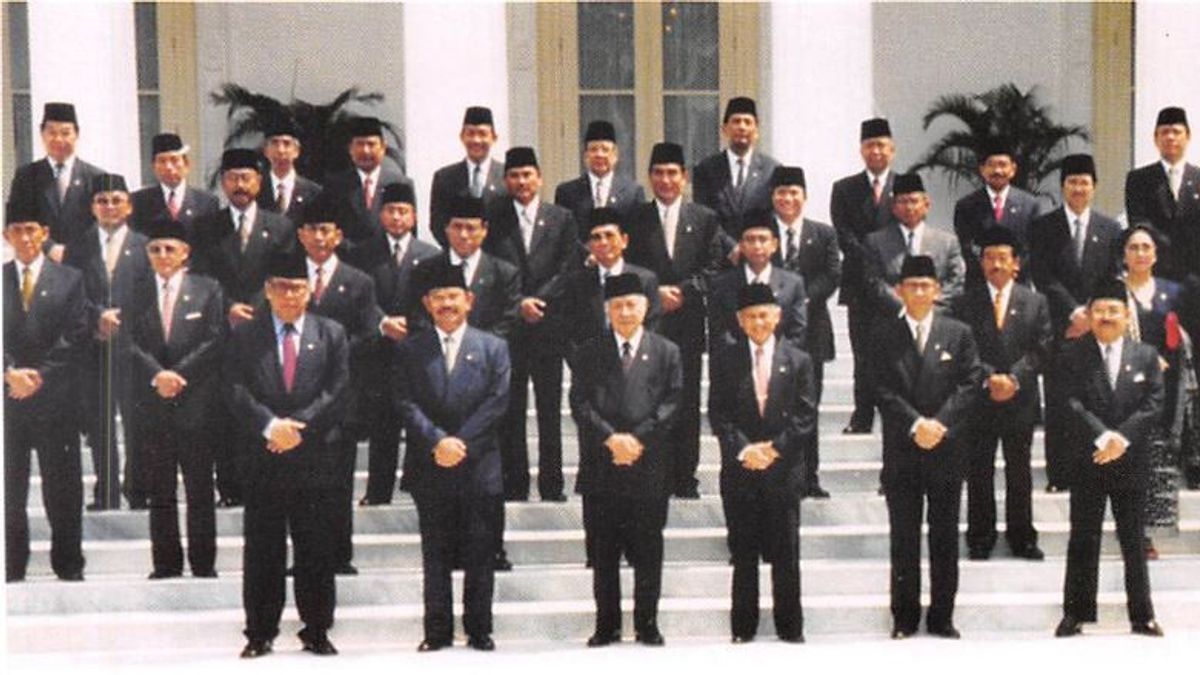JAKARTA - Today, 24 years ago, on March 14, 1998, President Soeharto announced the composition of a new cabinet. Development Cabinet VII, its name. This cabinet was deliberately formed by Suharto to end the impact of the 1997-1998 economic crisis. Suharto wanted the people's suffering to end soon. The result is the other way around. The upper-middle-class – including Suharto's cronies – did not seem to show their sympathy for the poor people. The people are angry. Suharto stepped down because of it.
The 1997-1998 economic recession was the toughest period in the nation's history. The rupiah, which is a reflection of the nation's self-esteem, fell to its lowest level. One US dollar, which was initially worth IDR 2,000 to IDR 15,000. This condition is getting worse because Indonesia is still dependent on a number of imported products.
Some imported goods, such as food, fruits, fuel, machinery, bicycles, to computers. A series of products that experienced a significant increase. Take the example of a computer, which before the recession cost IDR 1 million up ten times.
Speculation about the cause of the recession arose. Each expert even expressed their own views. The outline of the various arguments concludes that the recession did not happen suddenly. The recession emerged from the shift in political and social power that had occurred in Indonesia since the 1980s. The problem triggered high debt and changed the direction of the banking system to be more liberal.

All sectors will be affected. A number of companies and factories then competed to reduce their workers. In fact, it is not uncommon for a series of companies to go bankrupt. Losses that continue to be the estuary. Moreover, most of the materials depend on foreign imports. All the people also feel the pain hit by the storm of recession.
“How bad the condition of the Indonesian economy is like an airplane that is experiencing a super stall (swooping down sharply due to loss of lift). I had to use my instruments as hard as I could to get the plane to rotate quickly to prevent it from hitting the earth (in a form of hyperinflation).”
"Now the plane that almost crashed into the earth is already flying in a horizontal position. So don't kick the pilot's seat. Don't force others to take it. Don't do that, because the pilot did the right thing. It took me three years to fly a plane to great heights. But I don't want to sell soy sauce," said Bacharuddin Jusuf Habibie describing the impact of the recession as quoted by A. Makmur Makka in the book The True Life of Habibie (2008).
The poor economic conditions made President Suharto take control. He immediately made a plan. He made the formation of a new cabinet as a solution. Development Cabinet VII, its name. This cabinet is dominated by new people. Although many old names survive. Like the Minister of Foreign Affairs, Ali Alatas who has served for the third time.

In the eyes of the government, Development Cabinet VII is a solution. However, not for all Indonesian people. Instead, the cabinet was deemed not to reflect Suharto's serious intention to reform. The Development Cabinet VII will not be able to face a big problem: the economic crisis. The prediction was true. Shortly after the Development Cabinet was built, Suharto stepped down on May 21, 1998.
“The Development Cabinet VII that was formed by Suharto on March 14 is considered not to reflect President Soeharto's serious intention to reform. There are a number of new faces in the cabinet, but these new faces only exacerbate the character of KKN which has been very serious since the previous cabinet.”
“People believe that the composition of the Development Cabinet VII will not be able to solve the big problems they are facing, namely the economic crisis. The composition of the new cabinet has in fact convinced the public that Suharto did not listen to the aspirations of students and the wider community regarding economic, political, and legal reforms," concluded Muhamad Hisyam in the book Krisis Masa Kini dan Orde Baru (2003).
*Read other information about TODAY'S HISTORY or read other interesting articles from Detha Arya Tifada.
VOIR éGALEMENT:
The English, Chinese, Japanese, Arabic, and French versions are automatically generated by the AI. So there may still be inaccuracies in translating, please always see Indonesian as our main language. (system supported by DigitalSiber.id)












